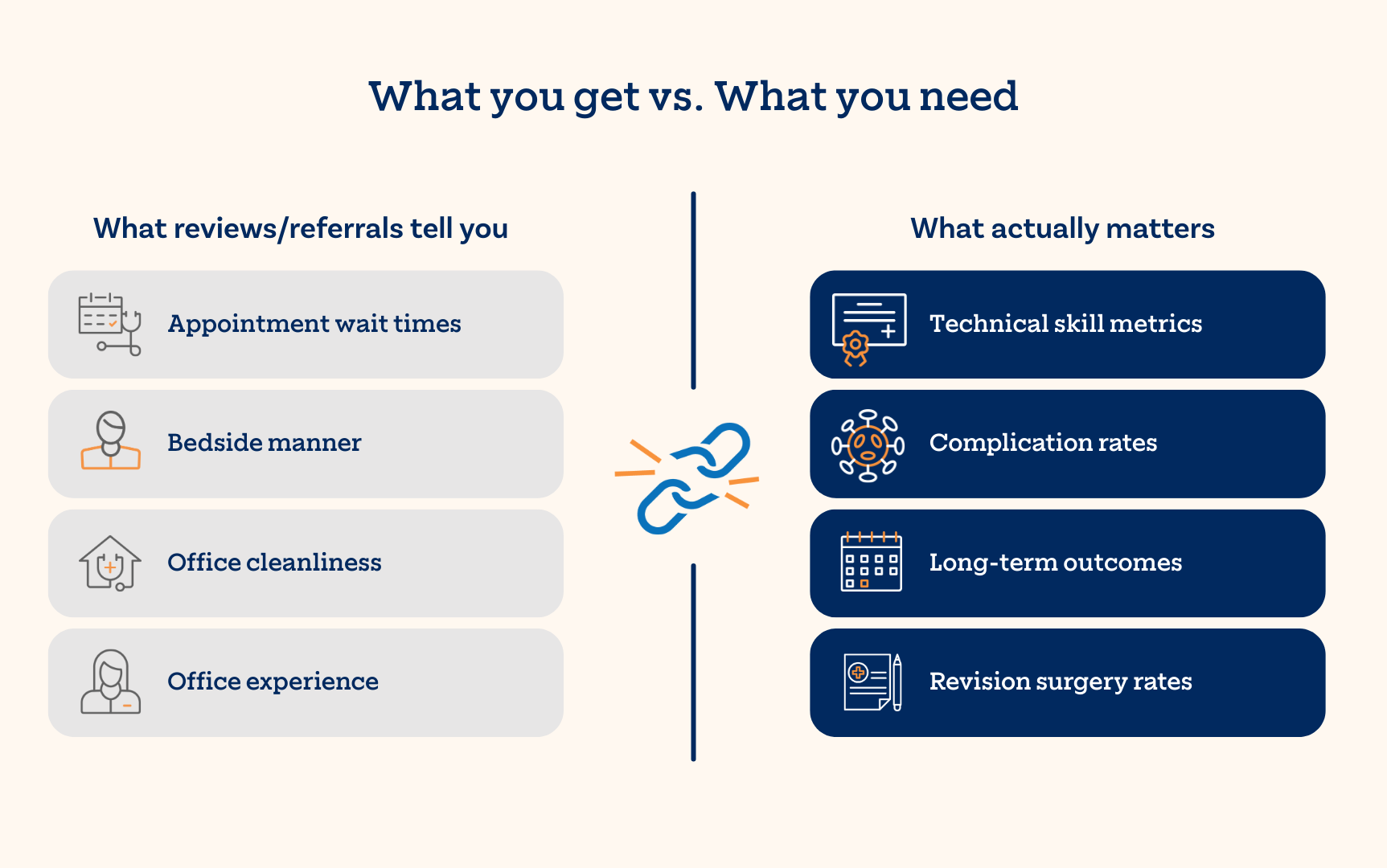If you’re facing knee replacement surgery, you probably want to get back to activities you love. Things like playing with your grandchildren, gardening, or walking without pain. But here’s something most patients don’t realize: your choice of surgeon can dramatically change your outcome.
The difference between surgeons isn’t just noticeable—it’s huge. One surgeon might have infection rates below 1%. Another doing the same surgery could have rates five times higher. Choosing a high-performing surgeon versus an average one could mean the difference between smooth recovery and years of problems.
5 problems every knee replacement patient should know
Every year, about 700,000 people get knee replacement surgery in the United States. Most think that since it’s common, outcomes are similar no matter who does it. That thinking could put your health at risk.
- Infection Problems: The Risk You Can’t See
Knee replacement infections require multiple extra surgeries and can permanently limit your mobility. These infections can develop years after surgery, making your surgeon choice critical for long-term health. - Repeat Surgery: When Your First Surgery Fails
The best measure of surgery quality is how often patients need another surgery because the first one failed. Depending on your age, repeat surgery rates can range from 4% to 35%. - Ongoing Pain: The Problem No One Talks About
Up to 44% of patients report ongoing pain after knee replacement, even after a technically “successful” surgery. This wide variation in pain outcomes directly relates to surgeon experience and technique. When you can’t return to the activities that motivated your surgery, the surgeon’s skill becomes deeply personal. - The Long-Term Picture Most Patients Never See
Most rating systems only track problems for 30 to 90 days after surgery. This includes many patient surveys and hospital quality measures. This is like judging a car’s reliability by how it runs in the first month. You’d miss all the problems that show up after 50,000 miles.
Many serious knee replacement complications don’t appear until months or years later, including component loosening, ongoing pain, and the need for repeat surgeries. - Volume Matters, But Track Record Matters More
You might think that choosing a surgeon who does many knee replacements automatically means better outcomes. Volume does matter—surgeons who perform very few procedures annually tend to have higher problem rates. But volume alone doesn’t tell the complete story.
Some high-volume surgeons still have concerning outcome patterns, while some lower-volume surgeons excel in specific areas.
What matters most is the individual surgeon’s track record with the specific problems that could affect your life.
Why reviews and referrals can’t predict your surgical success
Most patients choose their knee replacement surgeon based on:
- Referrals from their primary care doctor (often based on professional relationships or insurance networks rather than outcomes)
- Online reviews that focus on office experience and bedside manner
- Hospital reputation or proximity to home
- Insurance network participation

Here’s the problem: None of these factors tell you anything about what actually happened to previous patients during and after their surgeries.
Review sites might tell you that a surgeon has a pleasant bedside manner and a nice office. But they won’t tell you that the same surgeon has infection rates three times higher than average. Your primary care doctor might refer you to a surgeon because they work at the same hospital system. Not because they’ve analyzed that surgeon’s problem data.
At SurgeonCheck, we’ve observed that this knowledge gap leads many patients to make key healthcare decisions without full understanding. They remain largely unaware of the crucial factors that influence surgical success.
How to find the best knee surgeon
The data is clear: knee replacement outcomes vary dramatically between surgeons. The surgeon you choose has a greater impact on your surgical outcome than almost any other factor, including the hospital where your surgery is done.
Traditional selection methods—referrals, reviews, and hospital rankings—leave you making this critical decision without the information that actually matters: your surgeon’s track record with complications, revisions, and long-term outcomes.

What you need is objective, outcome-focused data.
At SurgeonCheck, we’ve analyzed millions of knee replacement procedures to identify surgeons who consistently deliver superior outcomes. Our surgeon-developed evaluation system tracks the metrics that actually impact your recovery: infection rates, revision surgery rates, and long-term outcomes.
Unlike review sites that focus on bedside manner or referral networks based on professional relationships, we never accept payment from surgeons to be recommended. Our recommendations are based solely on proven performance data.
No surgery is without risk, but selecting a surgeon with consistently better outcomes can significantly reduce your chances of complications, repeat surgery, and ongoing pain. Your mobility, quality of life, and freedom from pain are too important to risk on incomplete information.
Ready to find top-performing knee replacement surgeons in your area? Don’t trust your outcome to guesswork. Get the objective data you need to make an informed decision.
[Find Top Knee Replacement Surgeons Near You →]
Citations
¹ Which surgeon demographic factors influence postoperative complication rates after total knee arthroplasty at U.S. News and World Report top-ranked orthopedic hospitals? – PMC. Study of 660 orthopedic surgeons at 80 top-ranked hospitals from 2009-2013. Available at: https://www.ncbi.nlm.nih.gov/pmc/articles/PMC9252085/
² Knee Replacement Surgery Success Rate, Statistics, and Outcomes – Healthline. “However, newer practices of giving antibiotics during and after the operation have reduced the risk to less than 1%, according to the American Association of Hip and Knee Surgeons.” Available at: https://www.healthline.com/health/total-knee-replacement-surgery/outcomes-statistics-success-rate
³ The role of surgeon volume on patient outcome in total knee arthroplasty: a systematic review of the literature – BMC Musculoskeletal Disorders. “Three studies identified a statistically significant relationship between low surgeon volume and higher infection rates (0.26% – 2.8% higher).” Available at: https://bmcmusculoskeletdisord.biomedcentral.com/articles/10.1186/1471-2474-13-250


